MercoPress. South Atlantic News Agency
Tag: Nicolas Maduro
-
Monday, December 10th 2018 - 09:31 UTC
Maduro consolidates his power with victory in the municipal elections
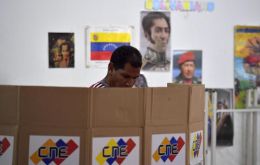
President Nicolás Maduro consolidated his power even more by sweeping the elections to elect the municipal councils before an opposition that mostly decided to boycott the process since they consider that there are no conditions to guarantee a transparent election.
-
Friday, December 7th 2018 - 02:32 UTC
Venezuela, Russia sign bilateral cooperation agreements in Moscow
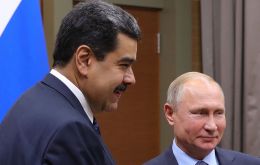
Venezuelan ruler Nicolás Maduro Thursday announced he had signed a series of bilateral agreements during his meeting with Russian President Vladimir Putin in Moscow. The cooperation accords are on mining, oil, telecommunications, weapons and food.
-
Wednesday, December 5th 2018 - 09:48 UTC
UN seeking US$ 738m to help neighboring countries receiving inflow of millions of Venezuelan refuges
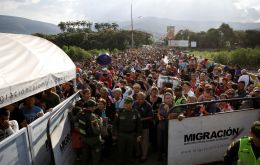
The United Nations said on Tuesday it was seeking US$ 738 million in 2019 to help neighboring countries cope with the inflow of millions of Venezuelan refugees and migrants, who have “no prospect for return in the short to medium term”.
-
Tuesday, December 4th 2018 - 10:44 UTC
Maduro off to Moscow in search of Putin's help

After meeting in Caracas with Turkey's President Recep Tayyip Erdogan, Venezuelan leader Nicolás Maduro took off for Moscow, where he hopes to hold some “serious talks” with his Russian counterpart Vladimir Putin in order to “strengthen and expand diplomatic relations and friendly ties between the brotherly nations.”
-
Tuesday, December 4th 2018 - 10:02 UTC
Erdogan voices Turkey's support to Maduro in Caracas
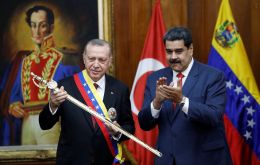
Turkish President Recep Tayyip Erdogan Monday said in Caracas that his country could cover most of Venezuela's financial needs and the government of President Nicolás Maduro invited him to boost new Turkish investments in areas such as gold mining and tourism. The main item between the two countries is gold marketing.
-
Monday, November 26th 2018 - 07:27 UTC
Bolsonaro will not return Venezuelans: “they are fleeing a dictatorship supported by Lula and Dilma”

President-elect Jair Bolsonaro said his government would not send back the tens of thousands of Venezuelans who have sought refuge in Brazil from the economic breakdown in their populist ruled homeland.
-
Thursday, November 22nd 2018 - 09:27 UTC
Trump administration considering imposing sanctions on Cuban military for helping repression in Venezuela
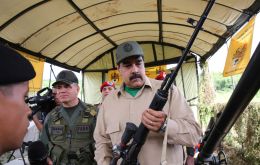
The Trump administration is considering imposing sanctions on Cuban military and intelligence officials who it says are helping Venezuela ’s government crackdown on dissent. Such sanctions would be the first time Washington has targeted a bloc of foreign officials allied with Venezuelan President Nicolas Maduro.
-
Thursday, November 22nd 2018 - 09:21 UTC
Venezuela: One billion dollars in bribes and illicit foreign currency operations

Venezuela’s former national treasurer admitted receiving over one billion dollars in bribes as part of illicit foreign currency operations that involved a local television mogul now indicted in U.S. courts, according to U.S. court documents unsealed on Tuesday.
-
Tuesday, November 20th 2018 - 12:55 UTC
Colombia to cut all diplomatic ties with Venezuela starting in January
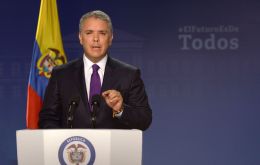
Colombian President Iván Duque announced that his country will sever all diplomatic relations with Venezuela as of January next year when Nicolás Maduro, whom he considers to be a “dictator,” starts a new consecutive term as head of state.
-
Friday, November 2nd 2018 - 09:05 UTC
More US sanctions on the “troika of tyranny” and its three dictator “stooges”

United States imposed new sanctions Thursday on Venezuela and Cuba and promised additional penalties against Nicaragua as the Trump administration laid out a hard-line policy toward countries the White House branded a “troika of tyranny.”
